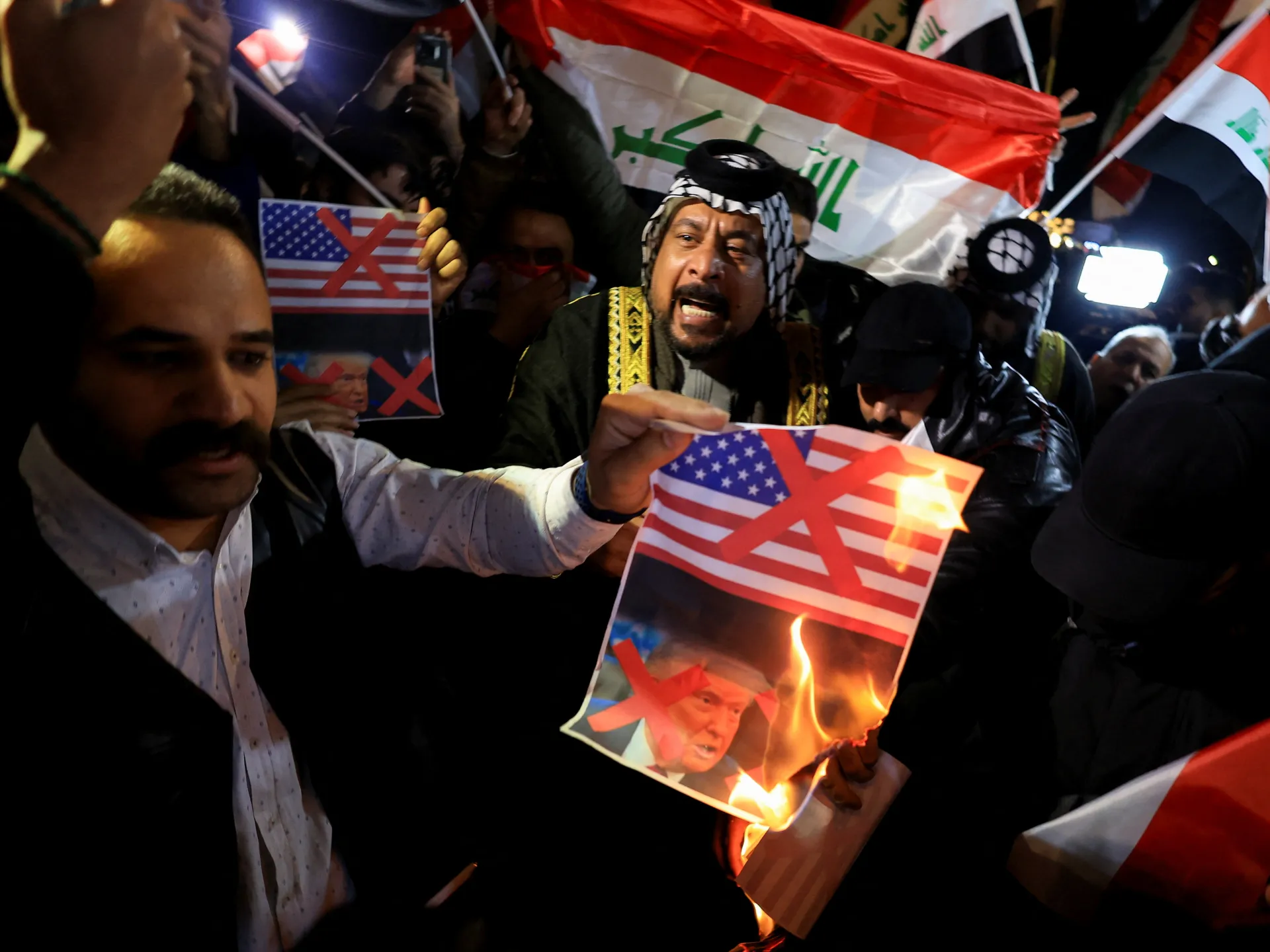Najaf, Iraq – Leaders of Iraq’s Coordination Framework – the Shia political coalition that came out on top in November’s parliamentary elections – are adamant that Nouri al-Maliki will be their candidate for the Iraqi premiership, even after threats from United States President Donald Trump.
Trump warned in late January that if al-Maliki, who previously served as Iraq’s prime minister between 2006 and 2014, returned to the role, then the US would cut off aid to Iraq.
Recommended Stories
list of 3 itemsend of list
“If we are not there to help, Iraq has ZERO chance of success, prosperity or freedom,” the US president wrote in a post on his Truth Social website.
Trump, and the US administration, view al-Maliki as part of Iran’s direct network of influence in Iraq, and fear that his return would undermine American efforts to weaken Iran’s power in its western neighbour, including limiting the reach of Iran-backed armed groups.
But, even with pressure ramping up, it appears that a majority of the Coordination Framework’s most influential actors are not willing to give up on al-Maliki, and are determined to find a way to push his candidacy forward.
Coordination Framework divided
The Coordination Framework (CF) is a coalition of Shia political parties established in 2021. It represents the biggest Shia bloc in the Iraqi parliament.
The loose nature of the coalition that makes up the CF means that opinions on al-Maliki’s candidacy are varied, with some opposing it, others willing to bend to Trump’s will and switch their backing, and still others who are adamant that they will push forward.
And it seems as though the majority are in the latter camp.
The CF issued a statement on Saturday reiterating its support for al-Maliki. “Choosing the prime minister is an exclusively Iraqi constitutional matter … free from foreign interference,” the statement added.
The statement reflects the position of various pro-Maliki forces in the CF, including former deputy parliament speaker Mohsen al-Mandalawi; the Badr Organization, led by Hadi al-Amir; and the Islamic Supreme Council, led by cleric Humam Hamoudi.
Current Prime Minister Mohammed Shia al-Sudani, whose party received the most votes in the elections but who did not receive the CF nomination despite his membership within it, is also officially supportive of al-Maliki’s nomination, even if he has not abandoned the possibility of continuing as prime minister himself.
Several of these factions did well in last year’s parliamentary elections, including al-Maliki’s own State of Law Coalition, as well as Badr and al-Sudani’s Reconstruction and Development Coalition.
But, with support from Kurdish and Sunni parties, the Shia al-Maliki sceptics have enough seats, and enough of a voice, to block the nomination if they desire to do so.
These include important Shia figures such as Qais al-Khazali, the leader of the Asaib Ahl al-Haq group; Ammar al-Hakim, the leader of the National State Forces alliance; and former Prime Minister Haider al-Abadi.
Al-Hakim, whose parliamentary bloc has 18 seats, warned that there would be “incoming economic repercussions” if al-Maliki was chosen, and added that “public interest must be prioritised over private interests”.
Meanwhile, the Victory Alliance, led by al-Abadi, issued a statement calling for “[the prioritisation of] the people’s vital interests given the exceptional circumstances Iraq and the region are experiencing”. Al-Abadi’s group has no seats in parliament, but retains an important voice within the CF.
Both statements contain a tacit acknowledgment of Iraq’s inability to withstand US pressure and the need for an alternative candidate suited to the current reality.
Other roadblocks
The CF, therefore, still has an uphill battle to confirm al-Maliki as prime minister. Outside of the Shia political groups, there is also opposition to al-Maliki, a divisive figure remembered negatively by many Iraqis, particularly Sunnis.
And there are also divisions within the non-Shia groups that are also slowing down the nomination process.
Under the Iraqi Constitution, parliament must first elect a president for Iraq, who then mandates the nominee of the largest parliamentary bloc to form the government. According to Iraq’s post-2003 “muhasasa” system of dividing political offices by sect and ethnicity, the prime minister must be a Shia, the president a Kurd, and the parliamentary speaker a Sunni.
To date, the main Kurdish factions – the Kurdistan Democratic Party (KDP) led by Masoud Barzani and the Patriotic Union of Kurdistan (PUK) led by Bafel Talabani – have failed to agree on a consensus candidate for the presidency.
The CF is attempting to broker an agreement between the Kurds. Recent efforts included a delegation led by al-Sudani meeting with both parties, and a personal visit by al-Maliki to Barzani. But these initiatives have not yet succeeded, and without a political agreement on the presidency, the process of designating a prime minister cannot proceed.
And even if the Kurds reach an agreement and don’t stand in the way of al-Maliki, the CF must persuade a long list of the former prime minister’s opponents.
Among them is Mohammed al-Halbousi, former speaker of parliament and leader of the Takadum Party, who issued a statement prior to the US veto implicitly rejecting al-Maliki’s candidacy.
Collectively, the anti-al-Maliki groups could gather roughly a third of the seats in parliament, enough to prevent a presidential election session due to a lack of quorum.
To avoid that scenario, the CF would have to either reset internal negotiations regarding the next prime minister, or nominate al-Sudani for a second term.
Al-Sudani’s party issued a statement on January 28 calling for “positive relationships with the United States” – a move interpreted as an indirect pitch for his renewal, leveraging his proven track record of managing relations with Washington during his tenure.
US leverage
The US may no longer be the occupying power in Iraq, but it still has enormous economic leverage over the country.
The revenue from Iraq’s main export – oil – is routed through the US Federal Reserve Bank in New York.
Trump may decide not to renew a presidential executive order, issued originally by President George W Bush in the wake of the Iraq War, that grants legal protection for the oil revenue funds and prevents them from being frozen by Iraq’s creditors. The order had been expected to be renewed as a formality upon its expiration in May.
If the US president decides against renewal, creditors will seek to claim their funds, and New York courts may issue rulings to freeze the Iraqi assets. This would disrupt the transfer of funds necessary to pay public salaries and sustain the economy for months or even years. In practical terms, the Iraqi economy would grind to a halt.
That therefore explains why the pro-al-Maliki bloc in the CF is attempting to persuade the US to change its position, rather than simply ignore Trump.
A high-ranking source in the CF’s State of Law coalition, who wished to remain anonymous in order to speak freely on the topic, told Al Jazeera there are “ongoing attempts to convince the US administration to lift the veto on al-Maliki”.
Aqeel al-Fatlawi, the State of Law spokesperson, also said he was hopeful that the US “will change its stance in the coming period”.
While blaming regional states, including Turkiye and Syria, for the US position towards him, al-Maliki himself has sought to soften his positions.
Syria has been one of the main points of difference between al-Maliki and the US, which has backed Syria’s President Ahmed al-Sharaa, even as the former Iraqi prime minister has denounced him for his past membership of al-Qaeda.
In a televised interview on Tuesday, al-Maliki used al-Sharaa’s full name, rather than the Syrian leader’s nom de guerre of “al-Jolani”, an attempt to emphasise that he was willing to move on from the past. Al-Maliki also attempted to soften his stance towards the Syrian government, directing his criticism towards the former regime of ousted President Bashar al-Assad and its role in supporting “terrorism” in Iraq.
Whether these attempts will go far enough to placate the US remains to be seen.
Reports indicate that US Special Envoy to Iraq Mark Savaya may have been removed from his position, although there is no official confirmation. His replacement would likely be Tom Barrack, currently the US ambassador to Turkiye and special envoy to Syria.
The CF favours Savaya, who has proven to be more supportive of using a more gradual approach in reducing the power of Iraq’s Shia militias, versus Barrack, who is viewed by the CF more negatively for his role in weakening Hezbollah in Lebanon and his support for Syria’s al-Sharaa.
An official announcement of a change could indicate where Trump’s thoughts are in the critical next few weeks – and whether the president will choose to not renew the US guarantee to protect Iraq’s oil revenue in May.

